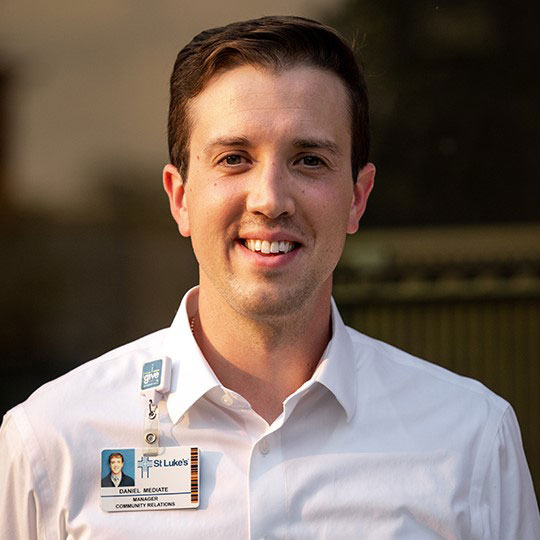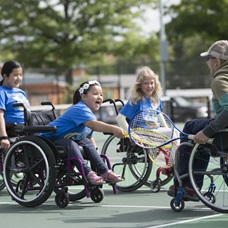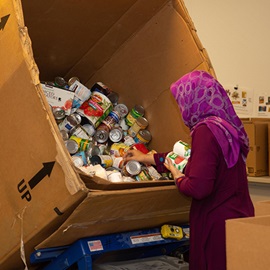Better Together
Mental health and the pandemic: How St. Luke’s, community organizations address increasing need

(This is the final installment in a four-part series on community health issues magnified during the COVID-19 pandemic. See the first, second and third parts here.)
The COVID-19 pandemic has magnified a plethora of community health issues that often operate in the shadows.
Issues like food insecurity, domestic violence and child abuse, housing instability and mental health.

All appear to be on the rise. St. Luke’s care providers have seen it in the emergency rooms and clinics. Social service organizations have noticed, too.
“The coronavirus pandemic has put a spotlight on and in some cases exacerbated community health issues that have been present in our communities for several years,” said Angie Gribble, St. Luke’s director of community health.
Earlier this year, St. Luke’s awarded more than 60 Community Health Improvement Fund (CHIF) grants to nonprofit organizations across the region supporting Idahoans in need.
St. Luke’s distributes CHIF grants yearly, typically aligned to the most significant health issues identified in its triannual Community Health Needs Assessments. This year, the issues mentioned earlier that have surfaced in the wake of the novel coronavirus took precedence for funding.
“We are prioritizing our engagement with organizations working to mitigate the effects of the pandemic,” said Dr. Alejandro Necochea, a hospitalist and member of the St. Luke’s Treasure Valley Community Board.
Mental health
Long before COVID-19 emerged, the prevalence of mental illness among adults was increasing, according to Mental Health America. The nonprofit organization recently reported that 19% of adults experienced a mental illness in 2017-18, an increase of 1.5 million people over the previous year.
The numbers after a year in the pandemic, though, are even worse — especially for kids. According to MHA, “youth ages 11-17 have been more likely than any other age group to score for moderate to severe symptoms of anxiety and depression.”
The Centers for Disease Control and Prevention also reported an increase in mental health-related emergency department visits among kids throughout much of 2020.
In addition to mental health care provided through St. Luke’s Children’s, the health system collaborates with community organizations that provide mental health care and emergency support to kids and adults.
“Everyone has a role in suicide prevention,” said Erin Pfaeffle, St. Luke’s Wood River director of community engagement. “It is an ‘everyone’ issue. As such, St. Luke’s is deeply committed to actively engaging in suicide prevention work in our communities.
“We know suicide can be prevented and mental health issues effectively treated, so supporting partners who actively reduce stigma and raise awareness around mental health issues, build protective factors, provide education and treatment is life-saving.”
St. Luke’s has awarded multiple CHIF grants to the Idaho Suicide Prevention Hotline, a vital statewide partner in the effort to halt suicide.
During the height of the initial COVID-19 outbreak in the spring of 2020, the hotline leadership made the difficult decision to ask their 80 trained volunteers who typically answer calls to stay home for health and safety purposes.
A small team of paid staff answered all calls, texts and online chats, 24 hours a day, seven days a week until they could bring back volunteers. An increase in calls on the heels of the coronavirus, coupled with a decreased capacity to respond, was tricky, said Lee Flinn, the hotline’s executive director. She praised the volunteers’ commitment despite the hurdles.

Flinn took over the hotline on May 1, 2020. While starting a job during a pandemic with an organization devoted to suicide prevention came with its challenges, Flinn has found hope in unlikely places.
“I get a lot of encouragement from the people who call us,” Flinn said. “We provide 24/7 crisis intervention and suicide prevention to people from every county in Idaho. It is amazing how resilient Idahoans are.”
The hotline’s goal is to keep people safe “for today, for right now,” Flinn said, providing a person the opportunity to navigate the crisis they are in.
“If we can help keep a person safe today, it is very possible that they may wake up tomorrow and they may feel much better, or they wake up tomorrow and they have the opportunity to get the health care or counseling they need,” Flinn said. “It’s very encouraging work. It may not seem like it from the outside. What gives me hope are the help-seekers who call us because they are incredibly resilient.”
In the first months of the pandemic, about 25% of calls to the hotline mentioned COVID-19 as a stressor.
That resonates with Pfaeffle, a trained social worker who also leads the St. Luke’s Center for Community Health in Hailey. The Wood River Valley experienced one of the nation’s worst coronavirus outbreaks in March and April 2020.
Over the past year, Pfaeffle has urged people in need to reach out.
“We know that personal loss, isolation, loss of income, impacts to family dynamics and fear are triggering mental health conditions or exacerbating existing ones,” Pfaeffle said. “As a result, many people may be facing increased levels of substance abuse, insomnia and anxiety. Learning to cope with stress in a healthy way will make you, the people you care about and those around you become more resilient.”
While the fight against COVID-19 is not over, Pfaeffle is optimistic about the future.
“I am hopeful that the mental health skills we have developed this year to manage the unexpected will be skills we employ through the rest of our lives after we recover from the pandemic,” she said.
Resources
Idaho Suicide Prevention Hotline: call or text 988
About The Author

Daniel Mediate works in the St. Luke’s Communications department.




